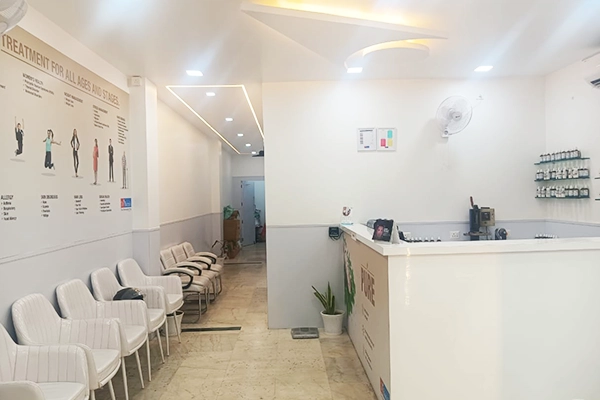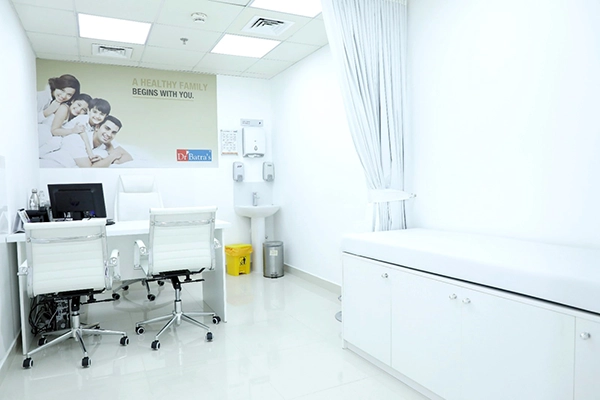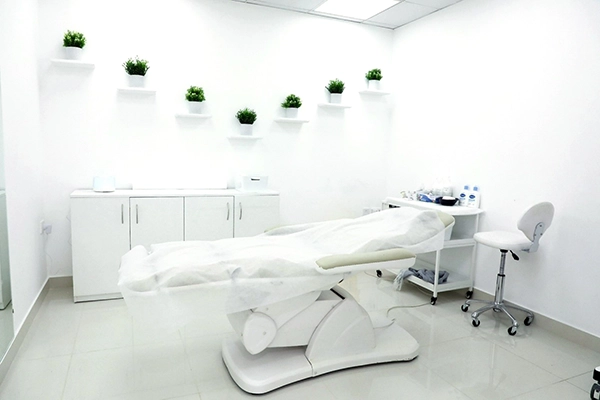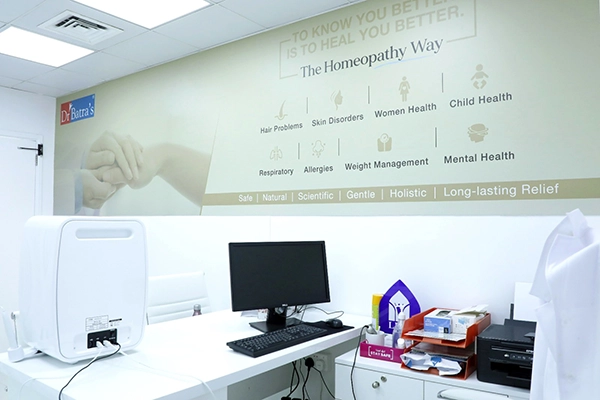Premenstrual Syndrome (PMS) Treatment in Dubai & Abu Dhabi
Premenstrual Syndrome (PMS) treatment is essential for women experiencing physical, emotional, and behavioral symptoms before their menstrual cycle. Symptoms like mood swings, bloating, fatigue, and irritability can disrupt your daily life, so managing PMS properly is crucial.
At Dr Batra’s® UAE, we offer a safe and natural approach to treating PMS symptoms. Our homeopathic treatments are designed to balance hormonal fluctuations, reduce discomfort, and improve overall well-being without side effects.
Book a consultation today and take control of your PMS symptoms naturally!
Why Choose Dr Batra’s® Clinics for PMS Treatment?
Trusted Expertise in Homeopathy
Dr Batra’s® has been a pioneer in homeopathic healthcare for over 40 years. Our experienced doctors have successfully treated thousands of women struggling with hormonal imbalances, mood swings, and other PMS symptoms, offering long-term relief naturally.
Personalised Treatment Plans
We understand that every woman’s body is unique. Our customised homeopathy-based PMS treatment ensures that your treatment plan is tailored to your specific symptoms, hormonal levels, and lifestyle needs.
Natural & Safe Approach
Unlike conventional medications that may cause side effects, our homeopathic treatments are gentle, safe, and free from harmful chemicals. They work by restoring your body’s hormonal balance and relieving discomfort without resorting to painkillers or synthetic hormones.
Holistic Healing from Within
Our treatment focuses on correcting internal imbalances, helping to reduce mood swings, cramps, bloating, and fatigue. By improving your overall well-being, we not only relieve PMS symptoms but also support long-term hormonal health. Take control of your health today! Book a consultation with Dr Batra’s® and experience safe, natural relief from PMS.
Get PMS Treatment at Conveniently Located Clinics in Dubai & Abu Dhabi
Reviews of Dr Batra’s® PMS Treatment in Dubai & Abu Dhabi
Our PMS Treatment Process
Step 1: Personalised Consultation
Our doctors conduct a detailed assessment of your symptoms, menstrual cycle, lifestyle, and hormonal health to identify the root cause of Premenstrual Syndrome (PMS) before recommending a treatment plan.
Step 2: Homeopathic Treatment
We prescribe natural homeopathic remedies that help regulate hormonal balance, reduce mood swings, and ease discomfort without synthetic hormones or painkillers.
Step 3: Holistic Lifestyle Guidance
Our doctors provide dietary and lifestyle recommendations to support hormonal health, including nutritional guidance, stress management techniques, and natural ways to alleviate PMS symptoms.
Step 4: Progress Monitoring
We track your symptoms and overall well-being, making necessary adjustments to your treatment plan for optimal relief and long-term menstrual health.
What is PMS?
Premenstrual Syndrome (PMS) is a combination of physical and emotional symptoms that many women experience before their menstrual period. These symptoms typically occur one to two weeks before menstruation and usually go away once the period starts.
Common symptoms include mood swings, tender breasts, food cravings, fatigue, irritability, and depression. While most women experience mild symptoms, some may have severe symptoms that interfere with daily activities.
PMS Symptoms
PMS symptoms can range from mild to severe and may vary from one cycle to another. These symptoms usually fall into two main categories:
Emotional Symptoms:- Feeling anxious, tense, or easily irritated
- Frequent mood swings
- Sudden feelings of sadness or crying spells
- Difficulty concentrating or feeling mentally foggy
- Trouble falling asleep or excessive sleepiness
- Bloating and fluid retention
- Breast tenderness or swelling
- Headaches and muscle aches
- Feeling more tired than usual
- Digestive issues like constipation or diarrhea
- Acne breakouts
Some women may experience only a few of these symptoms, while others may have a combination of both emotional and physical discomfort.
PMS Causes
The exact cause of PMS is unknown, but several factors may contribute to the condition:
Fluctuations in estrogen and progesterone during the menstrual cycle can trigger PMS symptoms.
Variations in serotonin, a brain chemical that regulates mood, may play a role in PMS symptoms.
Some women with severe PMS have undiagnosed depression, though depression alone does not cause all PMS symptoms.
Risk Factors of PMS
PMS is most common in women in their late 20s to early 40s.
If you have a history of depression, postpartum depression, or mood disorders, it can potentially increase the risk of PMS.
High stress levels, lack of physical activity, and poor diet that is high on salt, caffeine, sugar or alcohol may also contribute to experiencing the symptoms of PMS.
Potential Complications Caused by PMS
PMS is manageable for most women, but in some cases, it can severely affect daily life.
For example, women with PMS may experience intense mood swings, which may even lead to difficulties in personal relationships and at work.
In some extreme cases of PMS, some women may experience symptoms such as depression, severe irritability, anxiety, excessive self-criticism, and higher than usual number of conflicts with family, friends and co-workers. These could be cases of Premenstrual Dysphoric Disorder (PMDD).
PMS can also amplify conditions like migraines, depression, or anxiety for women who might already be experiencing them. More than 50% women report an increase in the intensity and frequency of migraine during PMS, as compared to migraine episodes occurring during any other times of the month. It is experienced either before or at the start of menstrual periods.
Many other chronic conditions, such as epilepsy, may worsen during PMS. Asthma attacks also often increase or worsen during PMS.
When to See a Doctor for PMS
You should consider seeking medical advice if PMS disrupts your daily life and making it difficult for you to focus on your work or maintain your relationships with your friends and family.
Another indication that it is time to see a doctor is if you are experiencing severe mood swings, intense sadness, or anxiety before your periods.
If you are struggling with PMS, you can book an appointment at Dr Batra’s®, where our doctors will examine your medical history, and recommend a personalised safe and natural homeopathic treatment plan that is both natural and safe to help you manage your symptoms and treat your condition without the risk of side effects.
Premenstrual Syndrome Diagnosis
There is no laboratory test required to diagnose PMS. A proper record history of the symptoms and observation of their recurrence every month before periods as well as the relief after periods are all good indicators of PMS.
Frequently Asked Questions about PMS
How do I know if I have PMS?
You will start experiencing PMS symptoms usually five to seven days before your menstrual period. The most common symptoms include mood swings, tender breasts, depression, food cravings, bloating, feeling tired, irritability and fatigue. If you have any of these symptoms, if they happen during the week before your period starts and go away when your period arrives, or a few days later, you may have PMS.
As there are so many possible symptoms of PMS, it is a good idea to keep track of them. Remember to note if the symptoms are mild, moderate or severe. Use a period and symptom tracker for two to three months and bring it to your doctor’s attention. A record of your symptoms can help our healthcare providers figure out the best treatment choices for you.
Does PMS decrease with menopause?
PMS symptoms usually cease when women are post-menopausal, typically one or two years after the final menstrual period. This is because the hormonal fluctuations that trigger the symptoms eventually settle down completely.
Can PMS be treated?
If PMS symptoms begin to interfere with your life, you should get yourself checked by our doctors as early as possible. The duration of treatment would entirely depend on the severity of your symptoms. However, PMS is certainly treatable and you can be relieved of all your symptoms with our treatment.
If I am suffering from other medical conditions, can PMS make my symptoms worse?
In addition to depression and anxiety, symptoms of other disorders can get worse right before your period due to PMS. Examples include migraine, asthma and allergies.
Someone told me that regular caffeine might cause PMS. Is this true?
High caffeine consumption has been associated with an increased incidence of PMS. It may make breast tenderness worse for some women. It is better to limit the consumption of caffeine.
Is it possible to ignore PMS? Or will this adversely affect my health?
It is not advisable to ignore PMS; in fact, you won’t be able to ignore it, as the symptoms will leave you tired, weak and lethargic all day long. You may not feel like working, and your intellect, creativity, and skills may lack vigour. This may lead to decreased productivity and may also compromise your family life. Do not ignore those pains and get yourself treated as early as possible.
Is PMS the same as your period?.
Some people seem to confuse it with the state of actually experiencing a period, when in reality, it refers to the time before the actual period. PMS symptoms start 5 to 11 days before menstruation and typically go away once menstruation begins.
Does PMS just mean bad mood?
That is not true. Symptoms of PMS vary in type, intensity and duration from patient to patient. Apart from bad moods, one may also suffer physical (weight gain, bloated feeling, breast tenderness, fatigue, acne, etc.) and mental (irritability, aggression, crying spells) symptoms.








